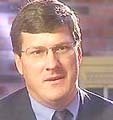 The New York Society for Ethical Culture hosted a discussion on Iran and US foreign relaions policy on October 16. It was aired Sunday on CSPAN2's BookTV. The guests were Scott Ritter, former UN weapons inspector and author of Target Iran: The Truth About the White House Plans for Regime Change, and Seymour Hersh, The New Yorker's national security correspondant.
The New York Society for Ethical Culture hosted a discussion on Iran and US foreign relaions policy on October 16. It was aired Sunday on CSPAN2's BookTV. The guests were Scott Ritter, former UN weapons inspector and author of Target Iran: The Truth About the White House Plans for Regime Change, and Seymour Hersh, The New Yorker's national security correspondant.Ritter took the opportunity to discuss his views on the Bush administrations foreign policy and the potential it has to incite war with Iran.

He also discussed the source of this policy. "Neo-Conservatives," as he calls them, including Republican minds like Dick Chaney, "Scooter" Libby and Donald Rumsfeld, have spent the last 20 years perfecting their ideas on nation building and the global pro-democracy movement, according to Ritter.
"They had twelve years under the Reagan-Bush administrations to practice it,
then spent eight years during the Clinton era perfecting it in think tanks," Ritter said.
It is from this political movement, according to Ritter, that the "Bush Doctorine" was derived. Wiki justifies the Bush policy as follows:
"The United States possess the means - economic, military, diplomatic - to realize its expansive geopolitical purposes. Further, and especially in light of the domestic political reaction to the attacks of September 11, the victory in Afghanistan and the remarkable skill demonstrated in focusing national attention, it is equally true that Americans possess the requisite political willpower to pursue an expansive strategy."
This is troublesome, as Hersh and the majority of the audience members in attendence of the event pointed out, because not every American agrees with the purpose or the practice of the "neocon" strategy. Although the power may be present, the question of will exists.
According to Ritter, the United States is not the only nation in which the Bush Doctorine is playing out. The UK has adopted it as well. And, accordingly, British military officials are calling for a change in policy.

"Sir Richard Dannatt is calling for [Prime Minister Tony Blair] to change its policy on Iraq," Ritter said, referring to statements made by UK's Cheif of the General Staff earlier this month. "British policy is destroying the British army."
In his book, Ritter discusses at length what he believes will be the result of the rhetoric coming from the White House at present: full scale war with Iran. He gave a point-by-point timeline for what he anticipates will occur following the October election season.
First, the Bush administration will begin working the politics of war with Iran by accusing them of developing a nuclear weapons program. Ritter, a weapons inspector for the UN from 1991-98 insists that no nuclear weapons exist in Iran, but the story will play out in Iran the same way as it did in Iraq: once the accusation is made, the US will do what it takes to prove that WMD's exist in Iran.
"The burden is on Iran to prove that they do not have nuclear weapons," he said. "But you can't prove a double-negative."
He then anticipates that the US will convince the UN to begin inspections, at which point Iran will pull its oil off of the market. Prices of gasoline will rise in the US, and the common consumer will feel the burden "in their pocket."
"The US is function just above margin. The US is not producing enough oil to support itself," Ritter said. "If Iran pulls its oil, the US will fall to about four percent below margin."
In the end, America's oil-addiction will drive us to war with the Iran. Iran will then turn to the North Korean's and the Chinese for nuclear weapon, according to Ritter, and it is at that point that we can expect to lose a US city to nuclear attack.
Herst was a bit more optimistic.
Although he did not disagree with Ritter's assessment of the Iran situation and the potential that US foreign policy has to start a war, he continually brought the conversation back to the fact that people in this country have varying opinions, and popular opinion has powe
 r.
r.Ritter made a statement at one point about the Secretary of State Condeleeza Rice's diplomatic trip to Iran. He called it fruitless, saying that she wasted time by talking to the Iranian President Mohammad Ahmedinejad.
"[He] has no power," Ritter said.
Constitutionally, this is true. The majority of power rests with the Prime Minister, the Shah and legislative parties in the Iranian government. But, Hersh interjected the importance of popular opinion.
As for the Bush doctorine, Herst said, "[Bush] is going to do what he's going to do whether its because of God, his father or whatever it is." He paused for a moment, and then, "...the twelvth step."
He said that if had any advice for the Joint Chiefs, it would be, "Let's take a mulligan." Go back and pray for forgiveness.



No comments:
Post a Comment